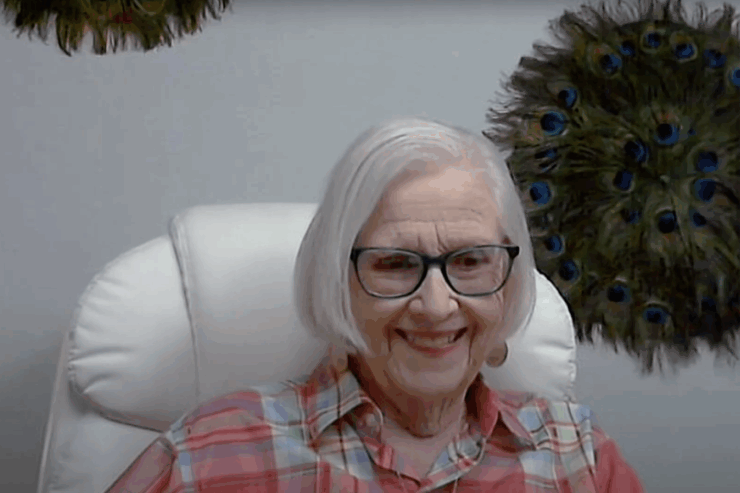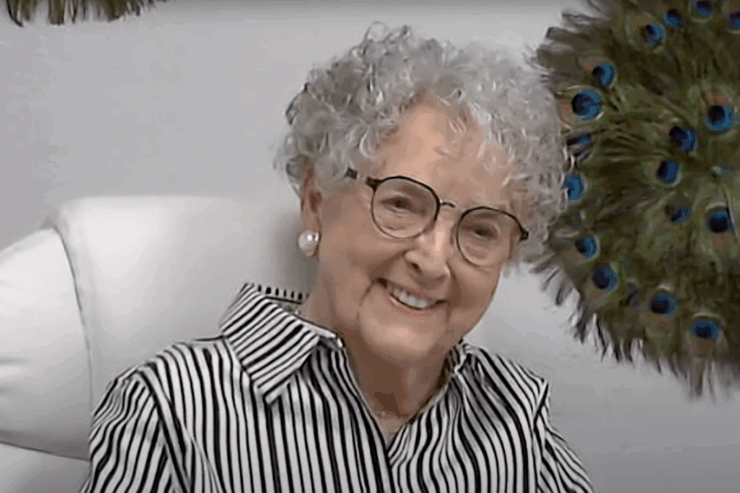
Intergenerational bonding has benefits for young and old
At times our oldest and youngest generations can seem far apart in their interests, attitudes, and technological knowledge, but bringing the generations together can have many benefits for both the seniors and the younger generation. Young people can learn from the wisdom and experience of older generations by spending quality time with seniors, while seniors can learn about new ideas and technologies and can gain a fresh perspective from those younger than them. There are many activities that can facilitate this type of bonding, whether they take place between grandparents and grandchildren, or through activities at a senior living community. We can also learn lessons from cultures where aging is seen as positive, and older generations are honored and sought out for their wisdom.
The Benefits of Intergenerational Bonding with Seniors
There are many benefits of intergenerational bonding with seniors for both seniors and younger generations. Seniors develop a stronger feeling that their life has purpose and meaning, and they stay physically and mentally active for a longer period. Interacting with older adults has many benefits for younger generations as well. Not only can children and youth gain a new perspective, they can develop their social and emotional skills. They can also gain a new understanding of the past, and skills and knowledge that can benefit them into the future. Interactions between older and younger family members can keep family traditions alive and provide meaningful connections between the generations.
Benefits for Seniors
An Improved Sense of Purpose and Meaning
When seniors act as mentors to younger generations, they gain a sense that their life still has importance, and that they have valuable experiences, skills, and wisdom to pass on to the next generation. Whether they are tutoring, volunteering at a nonprofit organization, or spending time with their grandchildren, they feel a sense of purpose and that their life has meaning. Sharing family stories and traditions can help them feel that they are leaving a legacy for future generations.
Increased Feelings of Well-Being and Physical and Mental Health
When seniors interact with younger generations, whether it be through volunteer activities or time spent with grandchildren, they make connections that help them to feel less isolated and lonely. A study conducted by the Corporation for National and Community Service found that adults over the age of 60 who volunteer report higher levels of well-being and lower disability rates than those who do not volunteer. They also stay physically and mentally active for much longer.
Opportunity to Learn New Skills
Just as seniors can teach younger generations the skills and knowledge they have attained, younger people can be teachers as well, enhancing the lives of seniors by helping them increase their technology skills. Learning about technology can help seniors to stay connected to the world through social media, email, and the internet, and can keep their minds active and engaged. Younger people can also help seniors to gain a different perspective about the world, and can help them to view the world through the eyes of a child again.
Benefits for Younger Generations
Learning to Slow Down and Have Patience With Others
Because some seniors may have reduced hearing or vision, and may move at a slower pace, younger generations who interact with seniors can learn to slow down, have patience, and listen well. They may need to slow their pace when walking alongside a senior, or offer their arm to steady them. They may need to wait for a few minutes for the older person to collect their thoughts or communicate. According to studies conducted in intergenerational programs, learning these skills at an early age can benefit everyone in life as they interact with others, and can make for a more caring and compassionate society.
Gaining Wisdom and Knowledge
Spending time with seniors can also be a wonderful way to not only learn about the past from someone who experienced it firsthand, but also to get some perspective on today and the future. Instead of just reading about events from a history book, younger generations can gain an understanding of what it was actually like to live through them. Hearing the stories from older generations can also give them a new perspective about the senior, and help them relate to them as someone who was once young like them. Grandchildren who spend quality time with grandparents can learn about their heritage and family traditions, whether they be recipes, religious or cultural events, or special celebrations. These positive experiences with older adults can provide a continuity between the generations and a greater understanding of each other.
Learning That Everyone Has Value
Often in our society, those who are aging can feel ignored by the youth-focused culture. Having meaningful interactions with seniors, such as learning about their past experiences and the wisdom they have to pass on, can help younger generations gain a new perspective and appreciate the contributions of others. When seniors are seen as mentors who can pass along knowledge and skills that can benefit future generations, they benefit as well by gaining a sense of worth, and a feeling that they have something to offer the world.
Reverence for Seniors Can Be Seen in Cultures Around the World
In many Western cultures, aging is seen as a negative, and youth is glorified. Often those who are older can feel like they don’t have anything to offer after a certain age. However, many other cultures celebrate seniors and the wisdom and insight that age can bring. In Greece, for example, those attaining old age are honored, and elders are respected members of the family unit and society who are valued for the wisdom they have to pass on to the next generation. In many Native American nations, elders are expected to pass down traditions and their life experiences to younger generations.
In India, multiple generations live in joint family units where the elders are supported by younger family members, and in turn, the elders help to raise their grandchildren. Their advice is sought on everything from family disputes to finances and traditions, so they feel that they are valued and have much to offer. In Japan, the elderly are revered and treated with great respect. They often work into their 80s and beyond, and have full social lives. As in India, several generations often live under one roof, so the elderly have social interactions with younger people on a daily basis.
These cultures recognize that elders have an important role to play in society and in the family unit. Because they understand that elders have valuable wisdom, knowledge, and traditions to pass on to the next generation, these cultures encourage Intergenerational bonding with seniors. Younger generations, in turn, share new energy, ideas, and perspectives with older generations. As a society, we can take these ideas of intergenerational bonding and apply them to our everyday lives.
Activities for Seniors and Younger Generations that Foster Connections
A study by the Penn State Extension found that multi-generational activities contribute to improved communication skills and the development of empathy in both seniors and younger individuals. Since we understand how important bonding with the elderly is, we should strive to find more ways to foster the relationships between young and old and spend quality time with seniors. There are many activities that can help to create these connections between the generations.
Playing Board Games
Playing board games together is a great way for seniors and young people to connect, because it generates discussions, friendly competition, and laughter. This can take place within families, or at a senior living community, recreation center, or library. Grandparents or older adults can teach grandchildren or young people to play the classic games they grew up playing, and even share memories of playing the games with family and friends. Younger generations can introduce new games, bringing a fresh energy to game night.
Taking Multi-Generational Family Trips
Going on a trip with multiple generations can draw young and old together and create lasting memories. It can be as simple and inexpensive as a trip to a history museum or a weekend getaway to a cabin in the mountains, or as elaborate as a trip to Europe. The setting isn’t as important as making quality time with seniors to get away from the stresses of everyday life, and taking part in activities that the whole family can enjoy together. Visiting areas the seniors grew up in can spark discussions about family history. Visiting amusement parks with children can help older generations experience the magic and wonder again through younger eyes.
Creative Projects
Creative projects can foster a sense of shared accomplishment among young and old alike, and can allow for new skills to be taught across generations. Creating a scrapbook of a family trip can bring joy as the memories are fondly recalled. Making a family recipe together can allow older generations to teach cooking skills that have been passed down through the family and allow children to feel pride in making something for everyone to enjoy and continue family traditions. Planting a garden, making a quilt, crafting, or creating artwork are other activities that multiple generations can enjoy together.
At Cadence at Olney senior living community, a Brownie troop paid a visit to bring holiday cheer through singing Christmas carols and joining residents in creating fun crafts. Young and old enjoyed hot cocoa and cookies, and the Brownies and residents enjoyed getting to know each other and creating something together.
Residents of Tribute at One Loudoun received an outpouring of love when students at the Newton School crafted special valentines for them. “Our residents were so grateful to receive these valentines from our young neighbors in the community,” said Nancy Higgs, Executive Director at Tribute at One Loudoun. “What a wonderful outpouring of kindness from these students. We appreciate them thinking of us during this sweet holiday!”
Attending Cultural Events
Music, dance, and theater can bring multiple generations together. When older generations attend performances of younger people, they show their support and enthusiasm for the performer. If multiple generations attend together as audience members, the experience can bring joy and deepen the connections they feel for each other as they experience something they are all passionate about.
At Tribute at the Glen senior living community, residents showed their support for students at the local high school by attending their spring band concert. One of the high school band members also works as a dining room server at the community, which made the event even more special. The seniors were able to get out and enjoy beautiful music, and the high school band members felt supported by the local community.
At Tribute at One Loudoun, children and teens from The Tracy Foundation shared their musical gifts with residents. These young musicians perform at hospitals, senior living communities, and community centers in supported housing locations, bringing joy to all who have the opportunity to experience one of their concerts.
Tribute at Black Hill residents had an unexpected treat from a group of young people in the area. Resident Lifestyle Director, Ashley Patterson, shared how excited the residents were to receive a surprise, last-minute performance by a college choir, which included one of the resident’s grandsons. “They made time on their busy tour to come perform for us,” said Patterson. “They were a talented group, and the residents enjoyed it!”
Community Service
Another opportunity for younger generations to spend quality time with seniors is to volunteer together for an organization they both feel passionate about. This could be walking dogs at an animal shelter, helping out at a food bank, or pulling weeds and planting vegetables in a community garden. These activities can help younger people to connect with seniors who share their same interests and may become mentors for them. It can also increase senior socialization as they get out into the community and interact with younger people.
When young people spend quality time with seniors, both generations benefit. Younger generations learn to slow down and develop patience and compassion for those who may need a little extra help, and that every person has value. They may also benefit from the wisdom and knowledge of older adults and may come to see seniors as mentors. Grandparents who spend time with grandchildren can pass on family traditions so they live on in the next generation. Senior socialization is an important benefit that older adults receive when they interact with young people. They feel that their life has renewed purpose and meaning, and that they have something to offer the next generation. They can also learn new skills from younger people that will help them to open new channels of communication and connect to the world. It doesn’t take much to bring the generations together if we just make the time to take part in activities that foster intergenerational bonding.
Boilerplate:
Five senior living communities in the Washington, DC metropolitan area – Tribute at One Loudoun in Ashburn, VA; Tribute at The Glen in Woodbridge, VA; Tribute at Black Hill in Germantown, MD; Tribute at Melford in Bowie, MD; and Cadence Olney in Olney, MD – are part of the Cogir Family of communities. What sets Cogir apart is the company’s devoted approach to creating healthy, vibrant communities that offer residents exceptional independent living, assisted living and memory care lifestyle options. Cogir Senior Living develops, owns and/or operates 60 lifestyle communities throughout the United States. For more information, visit us online.



